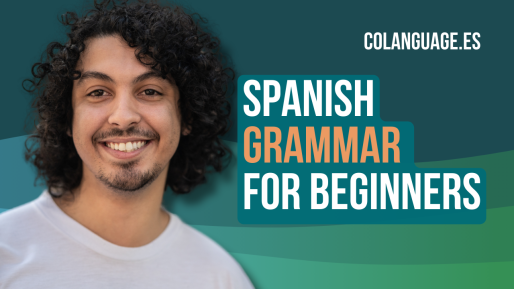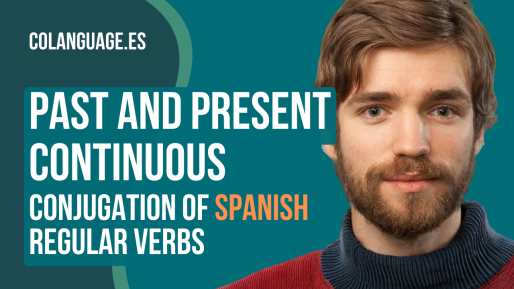Present participles (gerund) of verbs in Spanish Share Copied!
Spanish
Gerunds are used most often to form continuous tenses, like the present and the past continuous. Generally, gerunds are the "-ing" form of verbs.
Video
Podcast
What is a gerund?
The gerunds, also called present participles, in Spanish express an ongoing action. Gerunds are used most often to form continuous tenses, like the present and the past continuous.
-
Estoy bailando. (I am dancing.)present continuos
-
Estaban viajando. (They were travelling.)past continuos
Gerunds for regular "-ar" verbs in Spanish
To form regular gerunds for "-ar" verbs, the ending of the verb has to be removed for "-ando".
| Infinitive form | Spanish | English |
|---|---|---|
| Hablar (to speak) |
Yo estoy hablando por teléfono. | I am speaking on the phone. |
| Caminar (to walk) |
Tú estás caminando en el parque. | You are walking in the park. |
| Estudiar (to study) |
Ella estaba estudiando mientras cocinaba. | She was studying while she cooked. |
| Bailar (to dance) |
Nosotras estamos bailando en la fiesta. | We are dancing at the party. |
| Cantar (to sing) |
Vosotros estáis cantando en el coro. | You are singing in the choir. |
| Trabajar (to work) |
Ellos están trabajando en la oficina. | They are working in the office. |
Gerunds can be used to describe actions that are or were happening at the same time.
Ella estaba estudiando mientras cocinaba. (She was studying while she cooked.)
Listening exercise
This dialogue shows how the gerunds can be used, using both the present and past continuos tenses.
| Spanish | English | |
|---|---|---|
| María | Hola, ¿qué haces? | Hello, what are you doing? |
| Daniel | ¡Hola! Estoy hablando con mi hermana. ¿Y tú? | Hello! I am talking with my sister. And you? |
| María | Yo estoy caminando en el parque. | I am walking in the park. |
| Daniel | Pensaba que estabas estudiando para tu examen. | I thought you were studying for your exam. |
| María | Sí, ayer estuve trabajando toda la noche, y hoy necesitaba descansar. | Yes, yesterday I was working all night, and today I needed to rest. |
Generally, gerunds are the "-ing" form of verbs in English.
Gerunds for regular "-er" and "-ir" verbs
To form regular gerunds for "-er" and "-ir" verbs, the ending is omitted and replaced with "-iendo".
| Infinitive form | Spanish | English |
|---|---|---|
| Comer (to eat) |
Yo estoy comiendo una ensalada. | I am eating a salad. |
| Beber (to drink) |
Tú estás bebiendo café. | You are drinking coffee. |
| Vivir (to live) |
Ella está viviendo una experiencia única. | She is living a unique experience. |
| Abrir (to open) |
Nosotras estamos abriendo un negocio. | We are opening a business. |
| Vender (to sell) |
Vosotros estáis vendiendo muebles. | You are selling furniture. |
| Escribir (to write) |
Ellos están escribiendo en sus diarios. | They are writing in their journals. |
Gerunds can be used to express actions that accompany the main verb.
Alex llegó corriendo. (Alex came running.)
Listening exercise
Here, the gerunds of the "-er" and "-ir" verbs are practised in a dialogue, using both the present and past continuous tenses.
| Español | English | |
|---|---|---|
| María | Hola, ¿qué haces? | Hello, what are you doing? |
| Daniel | Hola, estoy comiendo una ensalada. ¿Y tú? | Hello, I am eating a salad. And you? |
| María | Yo estoy bebiendo un zumo y escribiendo una carta importante. | I am drinking juice and writing an important letter. |
| Daniel | ¡Qué bien! Hoy mientras desayunaba, estaba abriendo unas cartas. | Great! Today while I was having breakfast, I was opening some letters. |
| María | Yo me acordé de la carta mientras estaba corriendo en el parque. | I remembered the letter while I was running in the park. |
List of gerunds of common irregular verbs
Like in most grammar topics, there are always a few exceptions to the rule. Some gerunds do not follow the general patterns.
When the root of the verb ends in a vowel, the vowel becomes a "y".
| Infintive form | Spanish | English |
|---|---|---|
| Oír (to hear) | Estoy oyendo un ruido. | I am hearing a sound. |
| Traer (to bring) | Están trayendo comida para la cena. | They are bringing food for dinner. |
| Ir (to go) | Estamos yendo al cine esta noche. | We are going to the cinema tonight. |
Verbs in “-ir” that change their root vowel in the present also change in the gerund form. The “e” becomes “i”.
| Infinitive form | Spanish | English |
|---|---|---|
| Reír (to laugh) | Te estás riendo mucho con esa comedia. | You are laughing a lot with that comedy. |
| Decir (to tell) | Él está diciendo la verdad. | He is telling the truth. |
| Venir (to come) | Estáis viniendo desde lejos. | You are coming from far away. |
| Ser (to be) | Estoy siendo honesto contigo. | I am being honest with you. |
Verbs in “-er” and “-ir” that change their root vowel in the present also change in the gerund form. The “o” becomes “u”.
| Infinitive form | Spanish | English |
|---|---|---|
| Dormir (to sleep) | Estamos durmiendo poco últimamente. | We are sleeping little lately. |
| Morir (to die) | El héroe está muriendo en la película. | The hero is dying in the movie. |
Listening exercise
This dialogue puts into practise the irregular gerunds in Spanish.
| Spanish | English | |
|---|---|---|
| María | Hola ¿Qué estás haciendo? | Hi, what are you doing? |
| Daniel | Hola. Estoy haciendo una tarea para la universidad. ¿Y tú? | Hello. I am doing an assignment for university. And you? |
| María | Me estoy riendo con los chistes de mi hermano. | I am laughing at my brother's jokes. |
| Daniel | ¡Qué bien! Él siempre está diciendo cosas graciosas. | Great! He is always saying funny things. |
| María | Nosotros estamos yendo de camino al cine. ¿Nos vemos allí? | We are going to the cinema. See you there? |
| Daniel | Sí. Voy a esperar a mi hermana, que está durmiendo una siesta. | Yes. I am going to wait for my sister, who is taking a nap. |
Key takeaways
Here is a quick summary of this lesson.
- The gerunds (present participles) in Spanish express an ongoing action, in the past or in the present.
- Gerunds can also describe actions that are happening at the same time.
- There are several irregular forms of the gerund that often contain a change of the vowel.
Subscribe to our social media channels to get free daily exercises!



